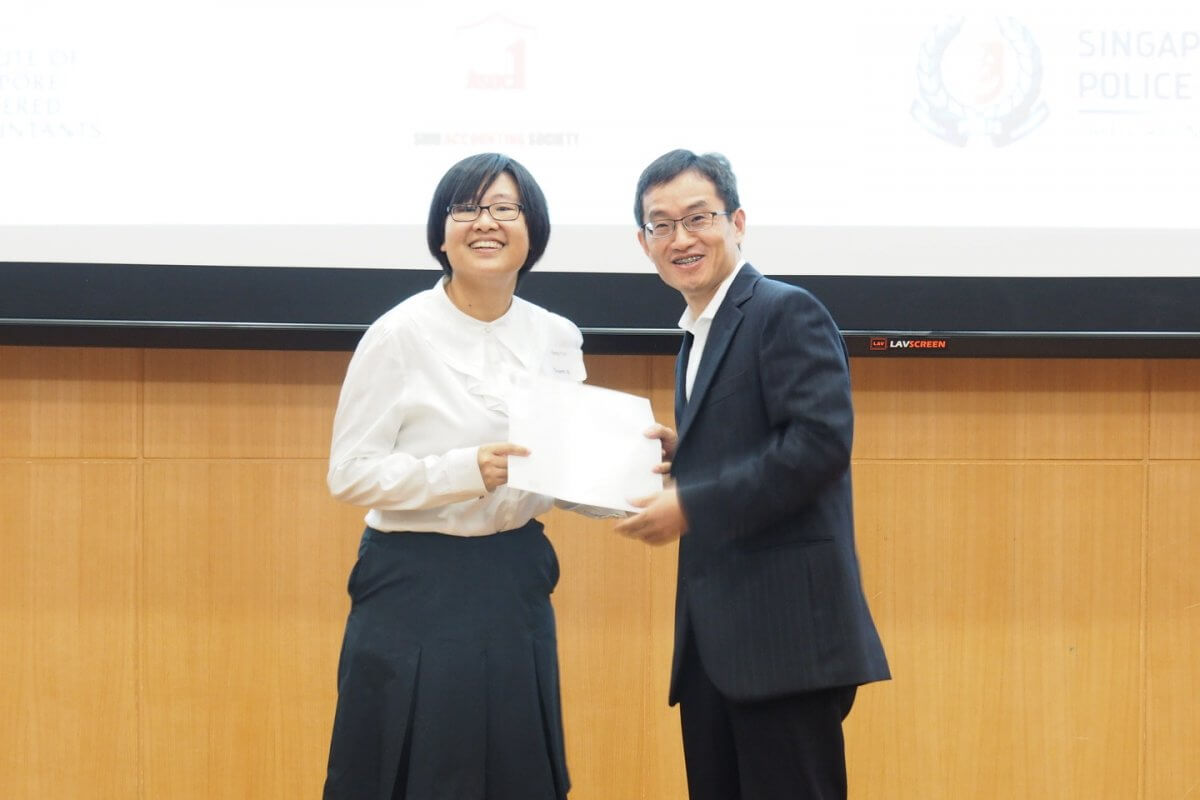By the SMU Accounting Society (ASoc 15th Management Committee)
With the growing digitalisation of the accounting and finance sectors, there is now an abundance of tools available for corporations to optimise their operations. From the automation of audit and accounting processes to enhancing security via blockchain, companies now have greater opportunity to add value to their various stakeholders.
However, new cyberspace challenges have also arisen. Based on KPMG’s Global Banking Fraud Survey 2019, cyber and data breaches remain the top challenge faced by financial institutions in the APAC region today. These were the challenges 46 teams from various polytechnics and universities had to tackle, as part of the first iteration of the SMU-ISCA Case Competition 2019. The competition was co-organised by the SMU Accounting Society (ASoc) and the Institute of Singapore Chartered Accountants (ISCA).

Excitement as participants queued for registration
Teams were tasked to uncover fraudulent practices in a case scenario modelled after actual cases tackled by the Commercial Affairs Department (CAD), a division of the Singapore Police Force. As the teams filed into SMU’s Ngee Ann Kongsi Auditorium, there was a bustling of activity as everyone was excited for the competition to begin.
In his opening address, Mr Kon Yin Tong, President of ISCA, shared about the many opportunities the case competition and Accountancy, in general, can bring to students. He expressed how delighted he was that ISCA was able to partner with both SMU and CAD in organising this year’s case competition. He added that he was heartened to see the overwhelming response for the case competition, and the strong rigour behind the challenges presented at this year’s competition, allowing for students to further hone their skills. He also conveyed how having an accountancy background can provide students with a strong foundation for the different roles in the accounting profession. In closing, Mr Kon shared how he hoped for the students to have an enriching experience and develop greater interest in the area of financial forensics.
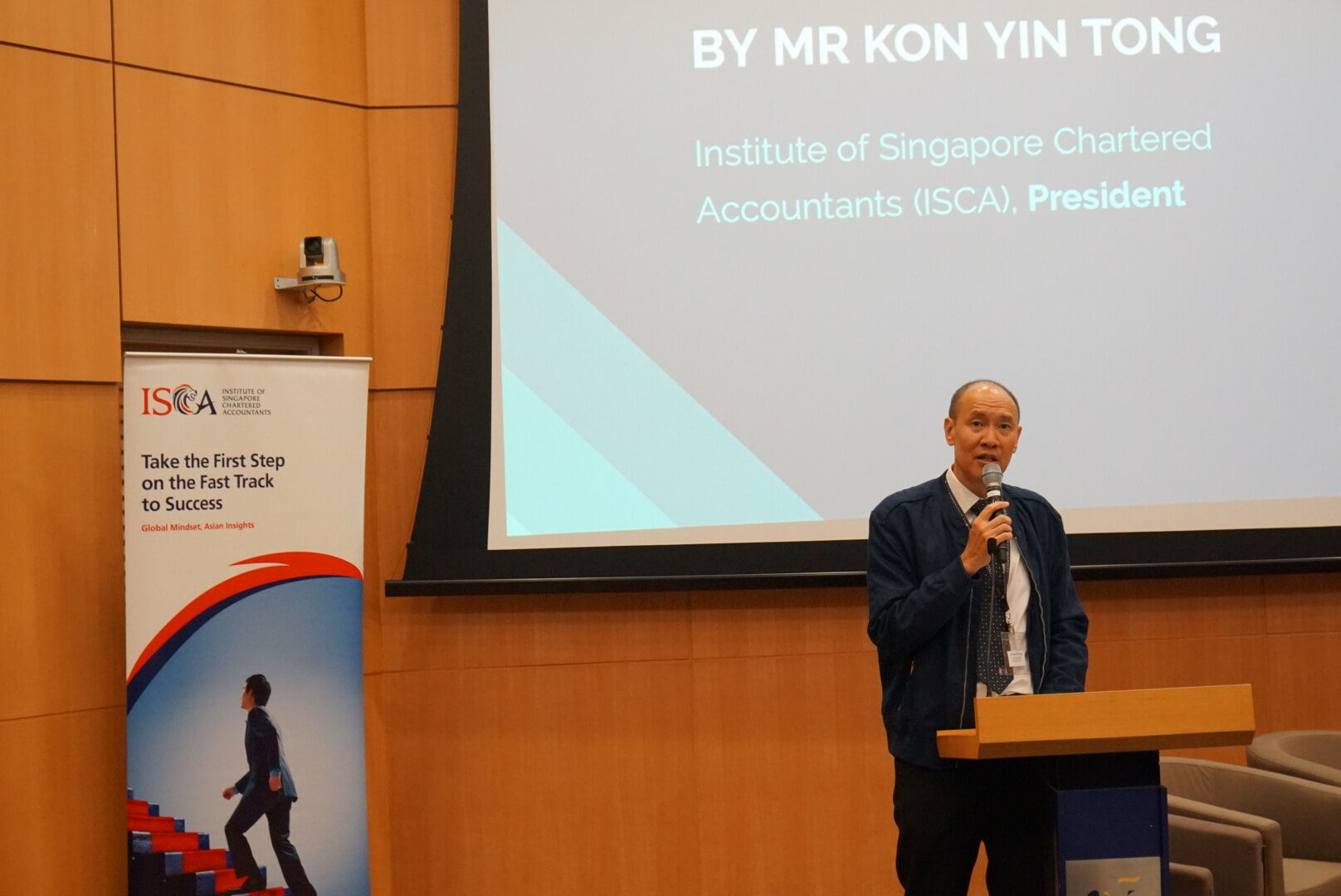
Mr Kon Yin Tong, President of ISCA delivers the opening address
After the opening address, Mr David Chew, Director of CAD, shared more about the challenges faced in an evolving and digitalised industry. As crimes get more complex and transnational, it is necessary for the public and private sectors to build up financial forensics capabilities to stay a step ahead of perpetrators and be able to detect a diverse range of fraudulent schemes ingeniously created to ensnare the unwary.
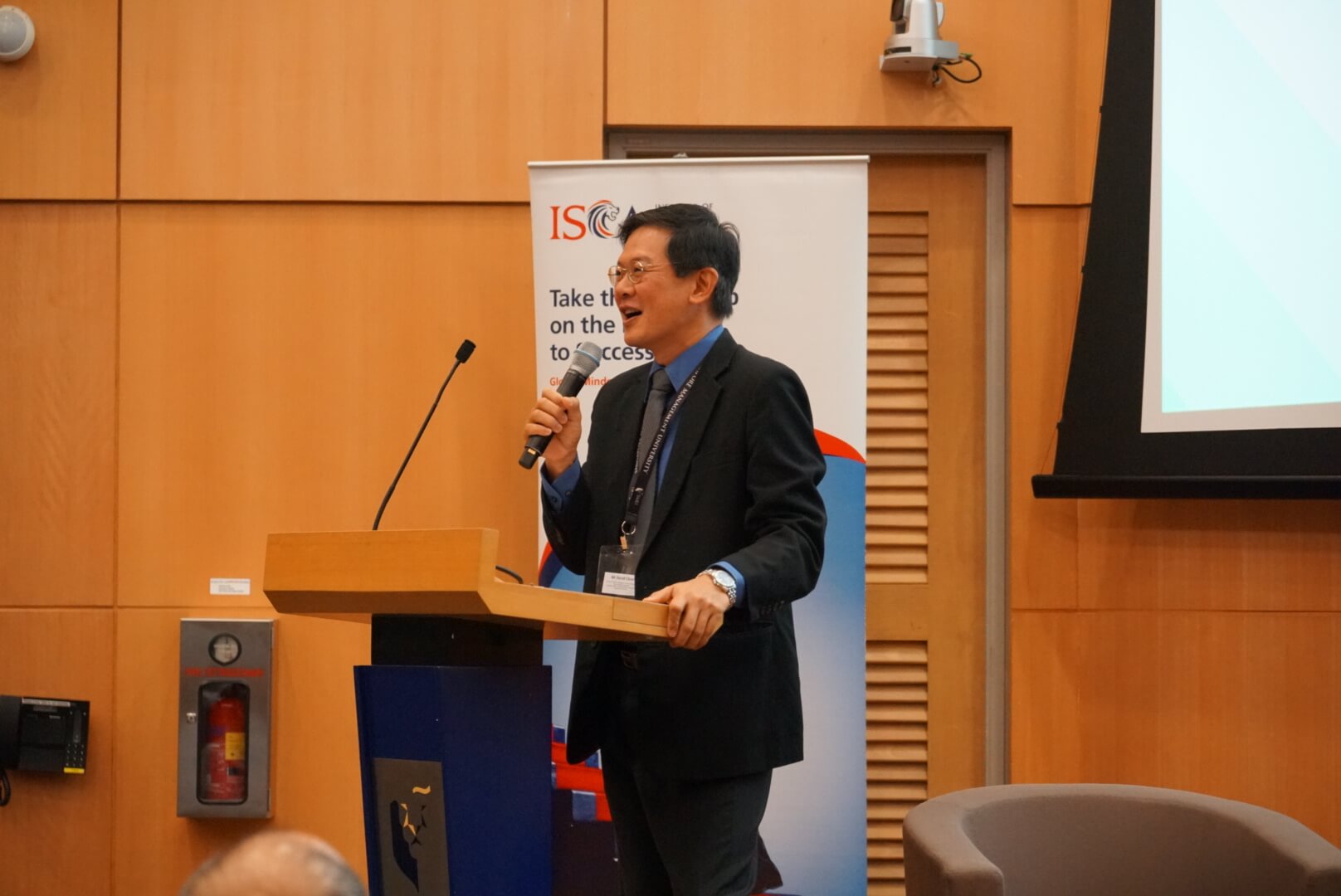
Mr David Chew, Director of CAD sharing the challenges faced by financial professionals
The Competition
The competition began with a multiple choice question (MCQ) segment, intended to test the participants’ industry knowledge. Constituting 40 per cent of their total grade, the test covered a wide range of topics, from financial crimes to investigative processes and techniques.
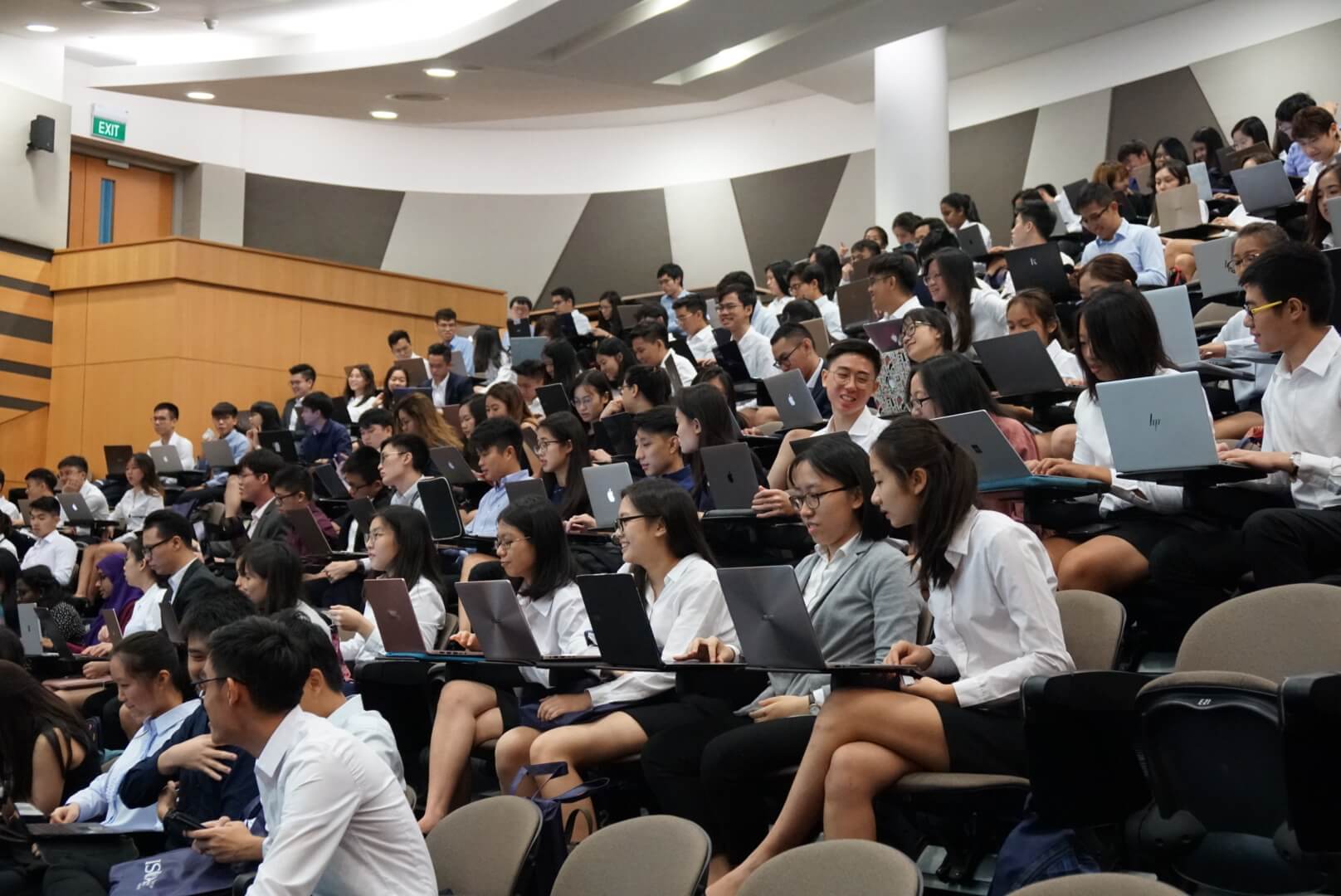
Participants getting ready for the MCQ quiz
Prior to the event, each team was required to submit a preliminary slide on a case study as part of their initial assessment. So while the MCQ segment was going on, the judges were also deep in discussion, evaluating which of the 46 teams were going to make the cut to proceed to the final run.
It was a tough decision for the judges as they deliberated between their two chosen teams. One team had the full richness of content, covering almost all of the bases when it came to post-actionable steps; whereas the other, while not as detailed, presented a well-rounded, concise picture of the case.
“I like the fact that they were able to succinctly deliver on the key points such that it was easy for the respective stakeholders to understand,” noted Mr Tan How Choon, Director of Forensic & IT Services at Rohan Mah & Partners, as he flipped through the prepared slide-decks. He added that it is always better to keep things to the point, especially when articulating to key stakeholders such as the board.
After the MCQ quiz and judges’ evaluation, the top three finalists were then given their final challenge. The teams were tasked to devise new fraud control policies, interview frameworks and stakeholder outlines based on freshly updated information, then present and justify their claims to the panel of judges—all within the span of three hours. This was a true test of their ability to think critically under pressure, as well as to model after the fast-paced and volatile line of work forensic professionals face on a daily basis.
Panel Discussion on Financial Forensics
As the finalists took their leave to prepare for their final presentations, the next programme on the agenda began with speakers taking their places for a panel discussion on financial forensics.
The open panel, moderated by Associate Professor Foo See Liang, was on the topic of “Career opportunities and skillset requirements in the financial forensics field.” Amongst the panellists included Mr Kon, Mr Chew, Mr Tan, Ms Lee King See [Director & Head (Banking & Insurance Investigations Division) of Enforcement Department at Monetary Authority of Singapore (MAS)], Ms Loretta Yuen (Executive Vice President of Group Legal & Regulatory Compliance at Oversea-Chinese Banking Corporation Limited), and Mr Lem Chin Kok (Head of Risk Consulting, Singapore and Indonesia; Head of Forensics, Asia Pacific at KPMG Singapore).
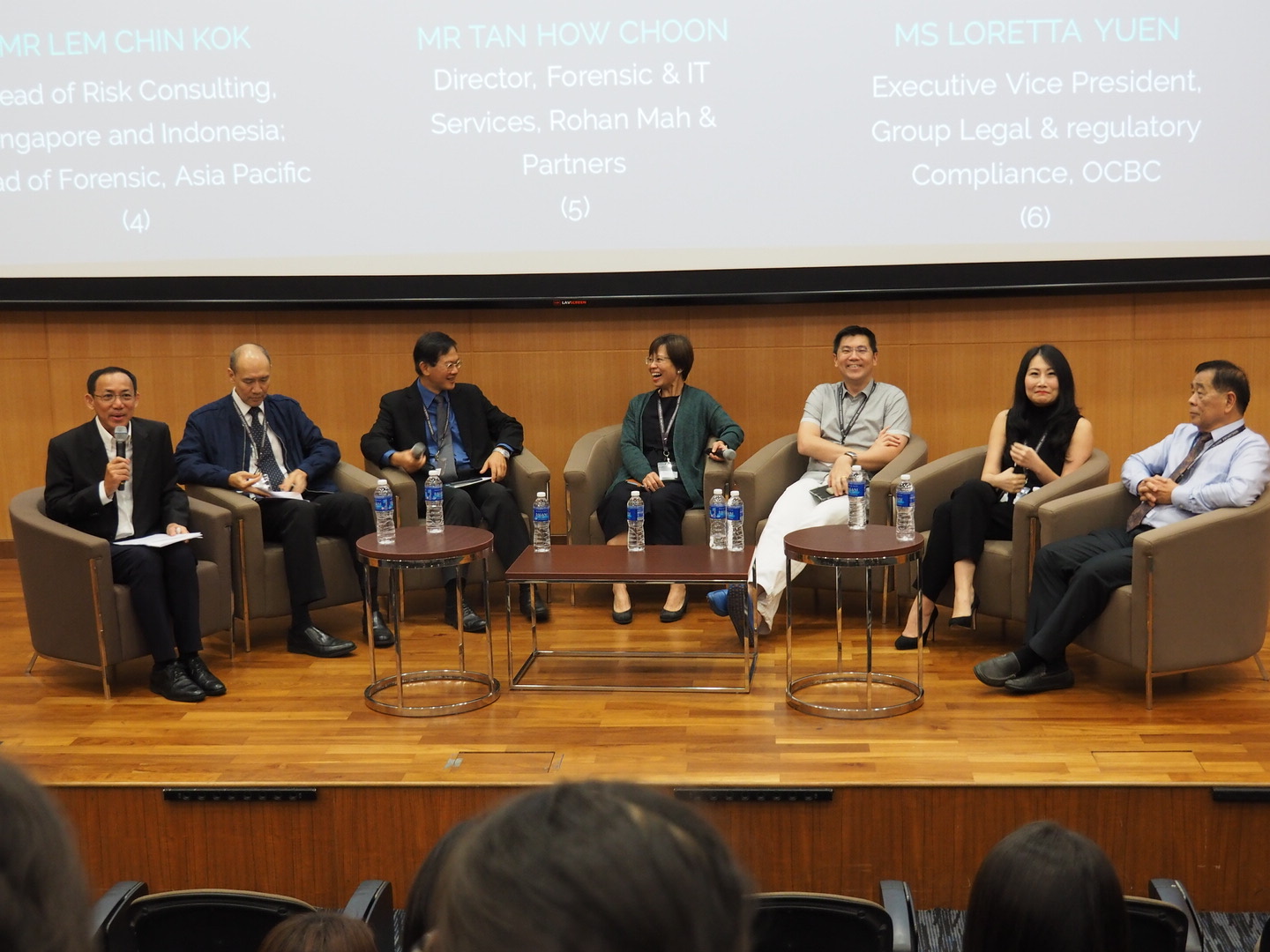
Panellists (from left to right): Professor Foo See Liang, Mr Kon Yin Tong, Mr David Chew, Ms Lee King See, Mr Lem Chin Kok, Ms Loretta Yuen, Mr Tan How Choon
The panellists mainly shared about the various evolving challenges that their organisations currently face, as well as the rigorous training programmes and career development available to help hone fresh graduates in the skills necessary to tackle such challenges going forward. They also touched on the various benefits that came along with such opportunities in the field.
Lunch was an opportune time for many of the participants to network with the industry professionals and to further engage with the panellists. Many were interested to hear more about working life in the different financial careers.
Final Presentation
Post-lunch, the finalist teams returned to the Auditorium, where they each presented on the case scenario, followed by a short Q&A by the judges. Each brought their own flavour and unique perspective to their presentation. The Alderaan Investigators team with their succinct and clear points, The Truth Seekers team with their witty motto in truth-seeking and the Nocturnals team with their strong depth in content.
An interesting insight that was shared in the post-presentation feedback, was how there is a need to be self-aware of the powers and tools that the individual or the organisation they represent possesses. When it comes to choosing between actionable steps to take, the decision-maker needs to know realistically what ‘hat’ they are wearing. If they do not possess sufficient power, turning to regulatory authorities could be a solution, albeit taken with discretion.
This also means that regulations should be applied universally; financial institutions and even regulatory bodies are subject to the same rules they impose. When it comes to enforcing the law, there is the utmost importance of due process in practice.
Although all teams demonstrated the potential and knowledge to put this into practice, the judges unanimously decided to award the Best Group Presentation and First Place to Team Nocturnals from the National University of Singapore.
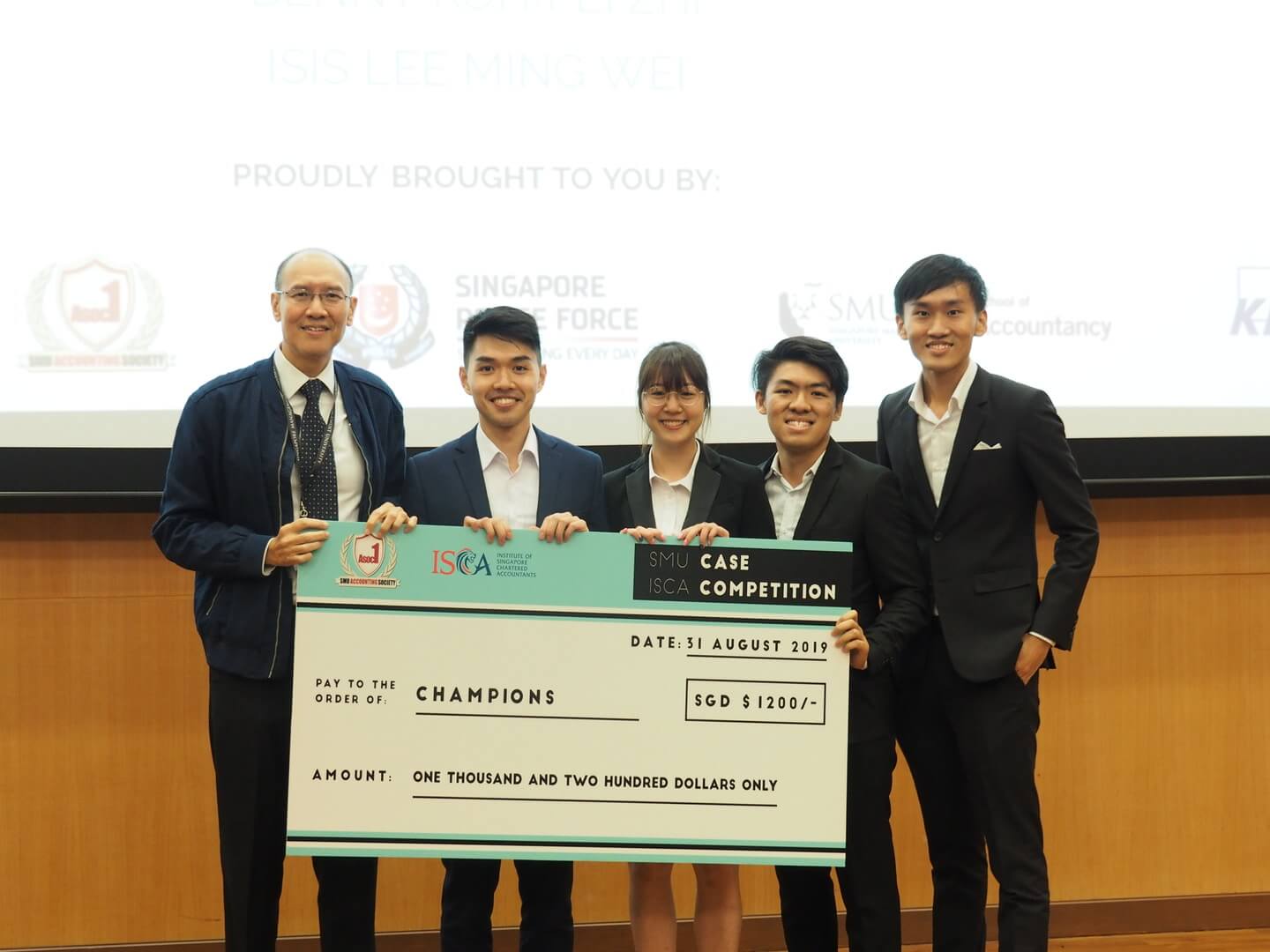
Team Nocturnals, the Champions of SMU-ISCA Case Competition 2019
Team Nocturnals delivered a very strong performance, outlining several key strategies to solve the case. Most notable was their creative use of AI technology in parsing key information, a solution well received by Mr Lem.
Besides the champion prize clinched by Nocturnals, Kang Yi Xi of Team Factastic also walked away with the Top MCQ Scorer Prize, while Isaac Lim Wen Liang of Team Nocturnals scored the Best Presenter Award. Congratulations to all the winners!
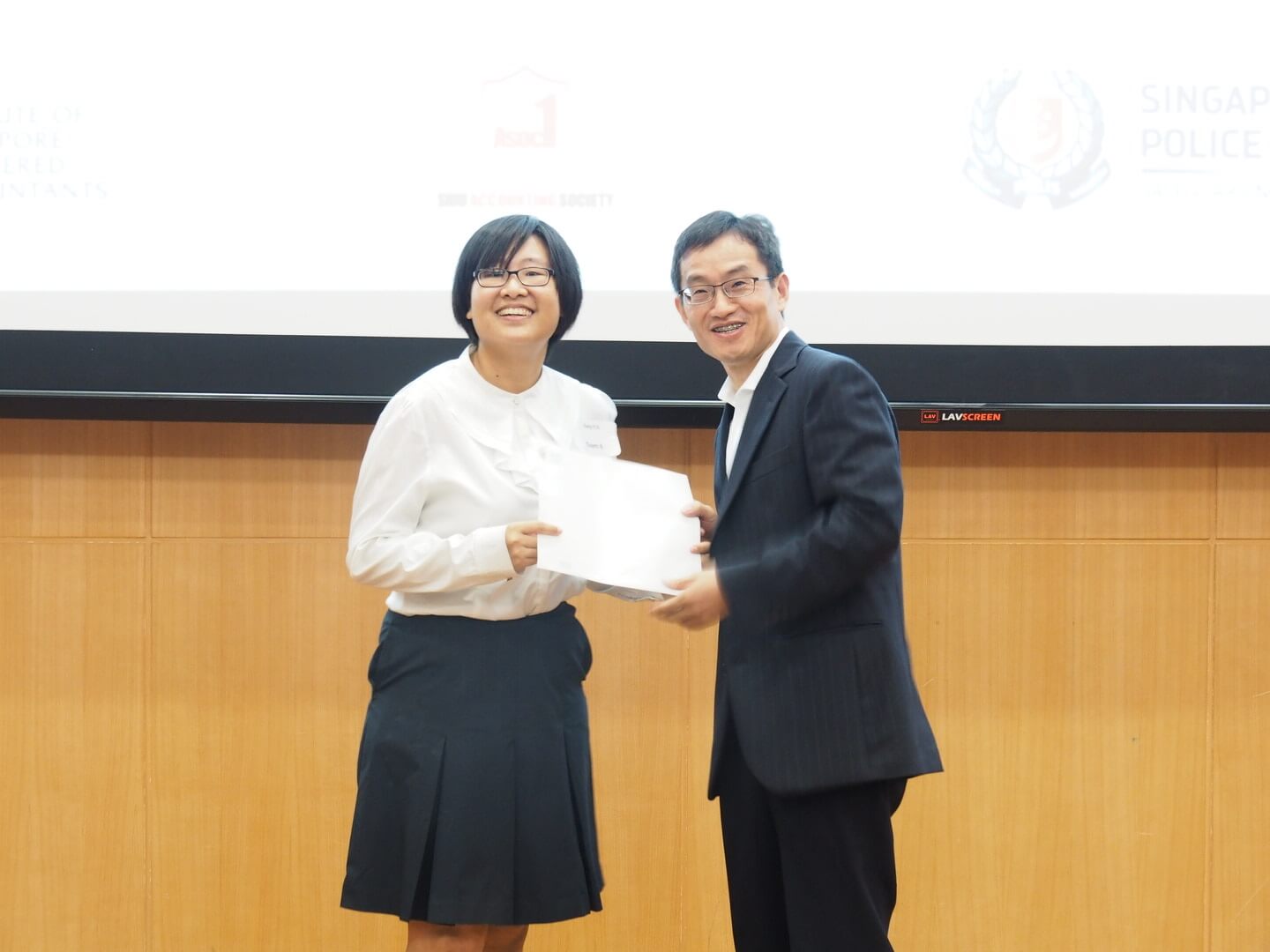
Ms Kang Yi Xi of Team Factastic, top MCQ Scorer
In his closing address, Dean of SMU’s School of Accountancy (SOA), Lee Kong Chian Chair, Professor Cheng Qiang, highlighted the role that students have to play in the future of the forensic accounting industry. He commented that the case scenario in the SMU-ISCA Case Competition allowed students to gain valuable insights on the role of forensic accounting in fraud, while demonstrating the importance of accounting data analytics as a skillset for financial professionals. This skillset forms an integral part of the accounting education at SMU SOA, and he was confident more participants will pursue this field of study in the foreseeable future.
“As a participant who is interested in financial forensics, I felt that the case competition gave us a good opportunity to have a taste of what tackling a real-life forensic engagement is like,” commented Ms Kang Yi Xi, the top MCQ scorer and final year SMU SOA undergraduate. This also reciprocated Professor Cheng Qiang’s view.
Indeed, with the successful completion of this inaugural competition, SMU looks forward to hosting future iterations of the SMU-ISCA Case Competition.
The above article was first published on smuasoc.com has been reproduced with exclusive permission from the SMU Accounting Society.

